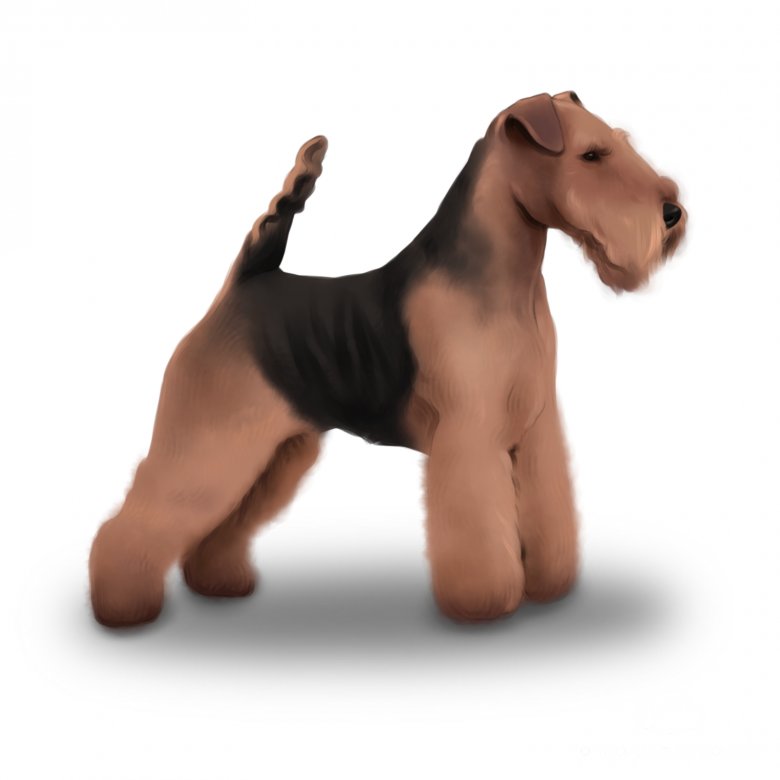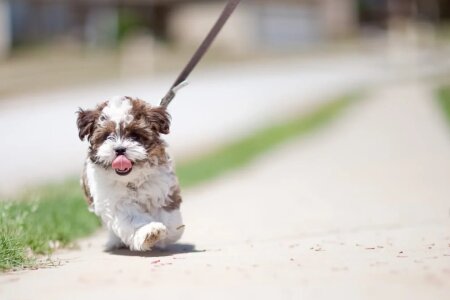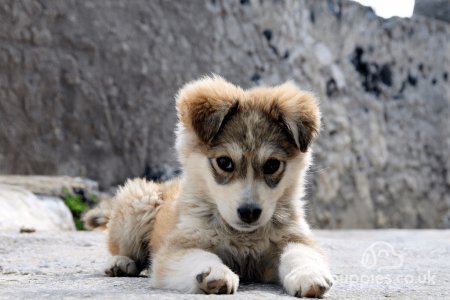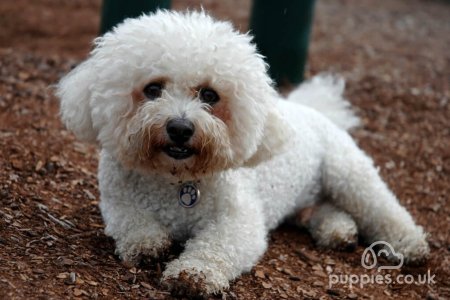Welsh Terrier (Welshie, WT, Daeargi Cymreig)
Overview
Often claimed to be the oldest existing dog breed in the UK, the lovely little Welsh Terrier is a true gentleman worthy of distinction in a loving home. Originally called the Welsh Black and Tan Rough Coated Terrier, the ‘Welshie’ is a working terrier breed that is highly adaptable as a companion pet.
Prospective owners looking for a quintessentially British breed well-suited to the British climate, a Welsh Terrier is a perfectly suitable choice of breed. Moreover, owners will be pleased to find that their intelligent, friendly, and loving temperament makes them wonderful companions.
Physical Appearance
The Welsh Terrier can be described as a small-sized, smart, hardworking, and compact breed. They are most easily distinguished by their ‘brick’ face and fluffy little beard and whiskers.
Their eyes are small and dark, their ears small and V-shaped, carried forward, and their tails are well set and carried erect whilst at a gait. Overall, the Welsh Terrier is a very well-proportioned breed.
Welsh Terriers have a short, wiry coat that is abundant and hard to the touch. The only permitted colour is black and tan with markings being undesirable. Black grizzle is a possible variation that is permissible instead of black.
The Welsh Terrier most closely resembles the Airedale Terrier, but it bears some resemblance to other terrier breeds as well.
How big do Welsh Terrier dogs get?
Character Traits
The temperament of the Welsh Terrier revolves around obedience and loyalty. They are wonderfully easy to train and learn obedience and discipline very well.
Another defining trait of the Welshie is his superbly affectionate, happy nature. This can transition into a somewhat volatile temperament, especially when he is excited, but rarely if ever will he show any signs of aggression.
As a terrier breed, the Welsh Terrier is intelligent and therefore can learn and recall commands from owners reliably and with minimal training required.
Are Welsh Terrier dogs intelligent? Yes.
Are Welsh Terrier dogs affectionate? Yes, very.
Do Welsh Terrier dogs have high or low energy levels? Very high energy.
Are Welsh Terrier dogs loyal? Yes, very.
Are Welsh Terrier dogs playful? Yes.
Are Welsh Terrier dogs aggressive? No.
Are Welsh Terrier dogs easy to train? Yes.
Are Welsh Terrier dogs good guard dogs? No, but they make for reasonably good watchdogs.
Ability to Socialise
Although mild-mannered and generally happy as a breed, Welsh Terriers do not tend to get along very well at all with other pets, including dogs, in the home. They are excellent as the only pet, but any other pets present at home may pose problems for the Welshie as he will constantly be vying for attention over the others, perhaps showing jealousy as well.
Around children, including young children, Welshies are exceptionally affectionate, playful, and pose little to no threat to smaller children as they are themselves rather small. They also tend to get along well with strangers provided they’ve been adequately socialised.
Do Welsh Terrier dogs get along with other pets? Not at all.
Do Welsh Terrier dogs get along with other dogs? Not at all.
Are Welsh Terrier dogs good with kids? Yes.
Are Welsh Terrier dogs good with strangers? Yes, they tend to be quite friendly around strangers.
Lifestyle Suitability
Historically, Welsh Terriers were kept as working terriers in the north of Wales for the purposes of flushing out rodents and game and for hunting foxes and badgers. While they can most certainly serve a more utility/working role to this day, many owners simply want a suitable companion pet for the home.
The good news is that they adapt very well to all sorts of living environments, including apartments and urban settings where most other breeds require large gardens and open spaces. Moreover, first-time owners will be delighted to know that Welsh Terriers are an excellent choice due to their ease of training, low-shedding coats, no drooling, and adaptability to the British climate.
On account of their adaptability, Welsh Terriers make wonderful companions for any owner that is willing and able to spend plenty of time with them, including the elderly or those living a more sedentary lifestyle. They still require ample exercise time, however.
On the downside, they do tend to bark excessively, much like other terriers.
Are Welsh Terrier dogs good for first-time owners? Yes.
Are Welsh Terrier dogs hypoallergenic? Yes.
Are Welsh Terrier dogs prone to drooling? No, not at all.
Are Welsh Terrier dogs a good breed for apartment living? Yes, they are suitable for apartments.
Do Welsh Terrier dogs shed a lot? No, they hardly shed at all.
Do Welsh Terrier dogs bark a lot? Yes, they are known to be yappy.
Can Welsh Terrier dogs be left alone at home? Yes, but only for a couple of hours.
Can Welsh Terrier dogs handle the heat? Yes, they prefer warm weather.
Can Welsh Terrier dogs handle cold temperatures? Yes.
Are Welsh Terrier dogs sensitive to loud noises? Yes.
General Health & Health Issues
Welsh Terriers are an extremely old breed, and over the decades and centuries (perhaps even longer), they’ve been bred for superb stamina and excellent health. That being said, there are some hereditary health problems that may present themselves in your Welshie, so endeavour to visit your veterinarian routinely to diagnose and treat any potential health issues sooner rather than later.
Some common problems include:
Skin allergies: allergies affecting the skin of your Welsh Terrier can arise from multiple factors such as their diet, unkempt coats, or environmental conditions. Have your Welshie diagnosed for allergies by your veterinarian;
Primary lens luxation (PLL): this heritable eye disease is rather common in terriers, including the Welsh Terrier and can lead to glaucoma;
Onychodystrophy: a condition that essentially means a ‘disorder affecting nail growth which results in brittle, weak nails.’
How long do Welsh Terrier dogs live? - 10-14 years
Exercise & Play Time
As can be expected for an energetic terrier, Welshies do need quite a bit of physical and mental stimulation in order to remain happy and healthy. Start off every morning with a good, brisk walk or jog for half an hour or so, followed by an hour or more of vigorous exercise in the afternoon or evening.
Terriers, including the Welsh Terrier, love to run and chase. It’s important to keep them contained in a garden by fencing off the garden area and to maintain supervision as they have a tendency to dig into the soil.
Around the water, Welsh Terriers often like to hop right in and go for a swim. Their dense, hard coats can attract bacteria, however, so it’s essential to dry them off (including their bears, whiskers, and ears) after a swim.
How much exercise does a Welsh Terrier dog need? - Around 1-1.5 hours per day
Do Welsh Terrier dogs like water play? Yes, most Welsh Terriers love to jump in the water on a hot day.
Nutrition & Feeding
Welshies are a small breed that doesn’t require too much to eat, which stresses the importance of a high-quality and nutritious diet. Bloat and gastric torsion are not particularly common with this breed, but it can nevertheless happen if your Welshie is not carefully fed in a few sessions broken up throughout the day.
It is important to abide by the breeder’s feeding schedule as closely as possible and adjusting as necessary to take into account the weight and development of your Welshie. Consult with your veterinarian if you require assistance with your Welshie’s diet and feeding regimen.
Are Welsh Terrier dogs prone to weight gain? Not particularly.
How much should I feed a Welsh Terrier puppy? About 100-175g per day, in 2-3 sessions.
How much should I feed an adult Welsh Terrier dog? About 125-150g per day, in total.
Care & Maintenance
Welsh Terriers are a demanding breed in terms of grooming, care, and maintenance. Their short, wiry coats are difficult to maintain and professional grooming is recommended throughout the year. Seasonal flea treatments are also important.
Emotionally, Welshies are quite demanding and require nearly constant attention. They are terriers and will quickly turn to destructive and naughty behaviour if they feel that they are neglected or ignored.
- Grooming: every day, carefully brush through your Welshie’s coat and remove any dead hairs. Check the ears and eyes for signs of infection. Pay close attention to the beard and whiskers as food often gets stuck inside during feeding.
- Emotional care: it is not recommended to leave your Welsh Terrier alone for any longer than perhaps an hour or two throughout the day. They thrive on human attention and interaction and quickly turn to boredom if they are alone for too long.
History of the Welsh Terrier
It is possible that the Welsh Terrier is the oldest existing breed in the UK and was native to the British Isles in the Celtic, pre-Romano-British period. Upon the conquest of Britain, Celtic tribes may have taken their dogs with them towards the ‘wild’ lands of northern Wales and the Lake District. Historians believe that the Welsh Terrier directly descended from the Black and Tan Terrier, now extinct.
As with most terrier breeds native to Britain, the Welsh Terrier rose in popularity at the height of the Industrial Revolution, when many terrier breeds were bred as working dogs used for fox and badger hunting as well as for flushing out rodents from homes and factories.
Formally recognised in the 19th century, the Welsh Terrier is today recognised by most international kennel clubs and associations yet remains at risk of dying out as a breed here in the UK.
Interesting Facts About Welsh Terrier Dogs
Former American president John F. Kennedy owned a Welshie named Charlie;
King Edward VII owned a Welshie named Gwen;
As a breed considered by the Kennel Club as at risk of dying, only 300 or so Welsh Terrier pups are bred every year.
Getting a Welsh Terrier Puppy
An ever-popular British breed, the Welsh Terrier is an excellent choice of puppy to purchase or adopt. Be aware that this breed is vulnerable in the UK and as such finding a reputable breeder is paramount. Please read through our buying guide before you decide to purchase a Welsh Terrier so that you are aware of the duties and responsibilities that come along with owning an adorable Welsh Terrier puppy.
How much does a Welsh Terrier cost to buy? - Over £800.
How much does a Welsh Terrier cost to feed? - An adult Welsh Terrier costs about £0.70-£1.00 per day to feed.
How much does insurance for a Welsh Terrier cost? - About £20-£45 per month.
Sensible alternatives to purchasing a new Welsh Terrier puppy include rescue and adoption.
Additional resources can be found via Welsh Terrier registries and associations such as:











